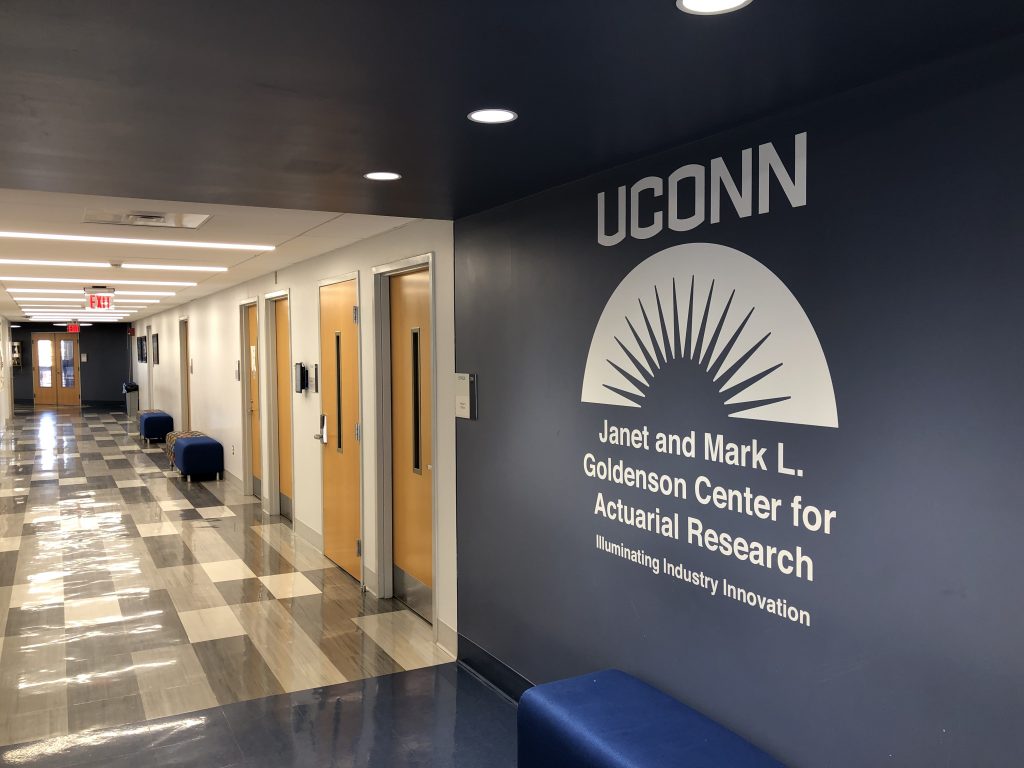The numbers have been crunched, and UConn’s Actuarial Science Program is a worldwide leader in its field.
“Our program has been recognized as a Center of Actuarial Excellence by the Society of Actuaries every year since the inception of the designation in 2009, and the Casualty Actuarial Society’s University Recognition program has recognized us at the gold level – the highest level,” says Andrew Niedzielski, director of the Actuarial Science Program at UConn, which is housed in the Department of Mathematics in the College of Liberal Arts and Sciences. “Not only do we believe we have one of the best programs in the world, but our program is recognized for its excellence by both external actuarial credentialing organizations.”
Only 42 universities in the world carry the designation of being a Center of Actuarial Excellence. Niedzielski explains that the award is based on attributes including: the program’s “quality of curriculum and faculty, student success on actuarial exams, student job placement, connection to industry, faculty research, and breadth of student research opportunities.”
The UConn Actuarial Science program currently has roughly 290 students at the undergraduate level.

Most actuaries work for insurance companies and consulting companies that support the insurance industry. They are business professionals who “combine mathematical skills with problem-solving and communication skills to identify, analyze, quantify and mitigate risks,” says Niedzielski. To become a credentialed actuary, an individual must pass a series of roughly ten rigorous exams. The UConn program helps students to prepare for several of these exams.
UConn’s program carries much prestige due to its proximity to Hartford, which many consider the insurance capital of the world. “We are also a stone’s throw from New York City and Boston, so our reach to industry is fantastic,” Niedzielski says.
The UConn Actuarial Society (UAS), a completely student-run actuarial club, hosts a speaker series where industry professionals come weekly during the school year to inform students of opportunities and give them advice. The UAS is also heavily involved in our annual actuarial career fair, which regularly attracts 50 companies looking for summer actuarial interns and full-time actuarial students. This direct industry connection is a crucial ingredient in making UConn’s program so accomplished. And with a job placement rate of 85-90% of U.S.-based graduates over the last several years, it’s clear that industry values UConn graduates.
The club also provides mentorship opportunities where newer students are paired with more experienced classmates to help them succeed. “One of my favorite aspects of our program is seeing how the students support each other. The care they show for each other is heartwarming” says Niedzielski.
Most of the professors and instructors in the program are credentialed actuaries who either work in the field or formerly worked in the field. “We bring that industry experience into the classroom. Students aren’t just learning from a textbook, they’re learning about the real world from currently practicing actuaries,” says Niedzielski.
“We are a unique body because we are, I call it, an applied actuarial research center,” says Jay Vadiveloo, a professor in residence in the Department of Mathematics and Director of the Goldenson Center for Actuarial Research at UConn. UConn gets projects from industry, and students get the opportunity to work on real-life cases, he says.
The Goldenson Center is open to all actuarial students, both graduate and undergraduate. Vadiveloo spent over 30 years working as an actuary in life insurance, and he uses his connections to find research opportunities for students. The hands-on work available for students at the Goldenson Center contributes to the prestige of the program.
The Goldenson Center runs a case study competition once a year, open to any undergraduate student. Vadiveloo gets projects from industry partners, and students get the opportunity to work as teams and present their findings and recommendations to professionals from the companies.
Vadiveloo also founded a program called the Students for Workers Movement. It involves UConn actuarial science students connecting with small businesses – primarily owned by members of marginalized groups, veterans, or people with disabilities – to help them identify and manage key risks the business faces. Given the high failure rate of small businesses, this is a program that Vadiveloo takes great pride in.
Other universities have approached Vadiveloo to ask how to create applied research projects like the ones run at UConn, he says.
A program called Math Motivators is another way students help the community. Students provide tutoring for underserved populations in the Hartford area, all on a volunteer basis. The program was started at UConn in 2015 and “now has grown to be a nationwide program that covers more than 20 states,” says Niedzielski.
Another measure of the program’s success is the recognition of its students. The Stuart A. Robinson Actuary of Tomorrow Scholarship is “generally viewed as the most prestigious of the nationwide actuarial science scholarship awards,” says Niedzielski. Typically, the national award is given to two or three students annually. Niedzielski explains that 12 UConn students have won this award since 2014. “The next closest university has four winners during that same time period,” says Niedzielski.
The research opportunities – “even at the freshman level,” says Niedzielski – along with the public service opportunities are important factors in what makes UConn’s Actuarial Science program so distinctive and successful.
“Ultimately, everything we do with our program is focused on one clear objective; to prepare our students to be successful actuaries and business professionals after they graduate and enter the workplace. I’m proud to be able to say that UConn’s Actuarial Science program has a long and storied history of doing just that,” says Niedzielski.



